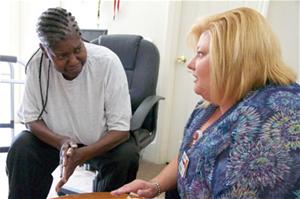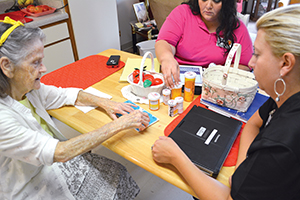By BETSY TAYLOR

Patient Armanda White, left, consults with community health worker Rhonda Wooten on her appointment and prescription schedule during Wooten's visit to White's Louisville, Ky., residence. White is taking part in KentuckyOne Health's Health Connections initiative.
Armanda White, 60, has congestive heart failure, gout and arthritis. White's son, daughter and the grandkids assist with cooking, chores at her home and with getting White to her medical appointments, but she credits a team from KentuckyOne Health with helping her improve her ability to manage her chronic conditions. "I'm getting to the point where I can be the provider for my grandchildren, instead of them providing for me," White said.
The KentuckyOne program, called Health Connections Initiative, fields a multidisciplinary team for home visits with recently hospitalized patients who have high medical needs, disjointed health care and high medical costs.
Each care team includes a registered nurse, a licensed practical nurse, a social worker and a community health worker. Team members work with patients for 90 days after enrollment, conducting home visits focused on medical and social services needs with a goal of improving patients' self-care and linking patients to a medical home for the future coordination of their care. The team can help patients with basic needs related to housing, transportation, food insecurity or low literacy, according to information from Kentucky–One Health. Members of the team make as many visits as needed to help each individual meet his or her personal health care goals and overcome barriers to care.
The core team is employed by VNA Nazareth Home Care. KentuckyOne's parent, Englewood, Colo.-based Catholic Health Initiatives, has a minority ownership in VNA Nazareth. Additional health professionals, including dieticians and substance abuse and mental health counselors, can take part in home visits, as needed.
Extended reach
KentuckyOne launched its pilot Health Connections Initative in Louisville last year as the state was preparing to expand access to Medicaid and launch a state-based health marketplace under the Affordable Care Act. This summer, CHI's Mission and Ministry Fund awarded a $1.5 million, three-year grant to KentuckyOne to expand the program to more patients in that city. It awarded the same sum to CHI St. Vincent Infirmary in Little Rock, Ark., so the model can be evaluated there. The hope is that the program's results will show improved care and quality for vulnerable populations and ultimately lower health spending, so that it makes sense to replicate it in other communities served by CHI hospitals.
The eight-month pilot program in Kentucky assisted 73 patients, who were assessed before and after the intervention. Overall, patients had a greatly reduced risk of hospital readmission, lower rates of depression, greater confidence in their abilities to manage their health and connection to a medical home for having participated in Health Connections, according to information from KentuckyOne.
Hot spotting
Rhonda Wooten, a community health worker with Health Connections, said a team started working with White in July. White, a Medicaid patient who worked as a certified nursing assistant until she injured her back, said she told the team she had a goal: "I wanted to make sure I wouldn't have to go to the emergency room so much." Before enrolling in Health Connections, White said she used to go to the emergency department about three to four times a month; she's gone just twice in the last four months.
Alice Bridges, vice president of healthy communities for KentuckyOne, said the program aims to identify and assist "super utilizers," or patients with complex health and social needs who frequently use emergency departments or are frequently hospitalized.
Health Connections is modeled on the work of Dr. Jeffrey Brenner in Camden, N.J. Brenner, a MacArthur award recipient who is executive director of the Camden Coalition of Healthcare Providers, gave a keynote speech at the 2012 Catholic Health Assembly about the effort he leads in Camden to coordinate primary care and social services for chronically ill patients living in a public housing complex — people whose care has been costly, fragmented and ineffective. The work has shown promise in improving outcomes, easing suffering and lowering costs, he said.
Risk calculator
In Louisville, potential participants were identified while hospitalized at Sts. Mary & Elizabeth Hospital or Jewish Hospital using a tool that calculates the patients' readmission risk.

Patient Carrie Brown, left, is visited in her home by community health worker Bethany May, center, and social worker Ashley Dawson, right. They are working with her as part of KentuckyOne Health's Health Connections initiative to help patients overcome barriers to care.
To take part in the program, the patients, who are not covered by commercial insurance, must reside in one of 10 low-income zip codes identified based on high inpatient utilization.
A team member visits the patient in the hospital to invite participation in Health Connections. The team member asks the patient's health care goal and inquires about factors that may be obstacles to good health including unsafe living conditions and tight budgets that make it a challenge to fill prescriptions or buy healthy, fresh food.
In White's case, Wooten helps her coordinate her doctors' visits and talks with her about questions she wants to ask the doctors during her visits. Wooten has attended medical appointments with White, reminding White to bring her medications to the visits. White said, as a result, she arrives "very prepared," with a clear agenda for what she wants to get out of the appointment.
The team and a primary care physician helped White schedule physical and occupational therapy and upcoming visits with a cardiologist, a neurologist and an endocrinologist, Wooten said. The care team has also linked her to a medical transportation service for when a family member or friend isn't available to drive her to appointments.
Arkansas initiative
The Health Connections Initiative in Little Rock started in March with patients discharged from CHI St. Vincent Infirmary. More than 30 patients have taken part in the program. The goal is to have 114 program graduates a year during the three-year commitment, said Jon Timmis, executive vice president and chief strategy officer for CHI St. Vincent. The care team at CHI St. Vincent is working with patients from five zip codes in some of the poorest sections of midtown and southwest Little Rock.
Timmis, who described a program structured like the one in Louisville, said many more patients in Arkansas have health insurance this year than last owing to the Affordable Care Act. Under a Health and Human Services waiver, Arkansas is using federal funds to buy private insurance for income-eligible people rather than expanding Medicaid in the state. Timmis said that has meant increased access to health care, but for his system, it also has meant emergency department business is up about 25 percent from fiscal year 2013 to fiscal year 2014.
He hopes the care team model will show reductions in emergency department visits. To him, however, the program signifies something much more than that. "Our mission is to serve the poor and vulnerable," he said. Health Connections works to help people with obstacles and link them to improved health care — "exactly the things we should be doing," he said.
See a video about the program.
Copyright © 2014 by the Catholic Health Association
of the United States
For reprint permission, contact Betty Crosby
or call (314) 253-3477.